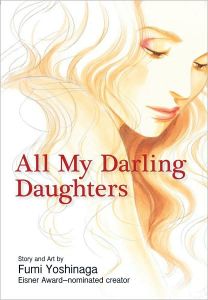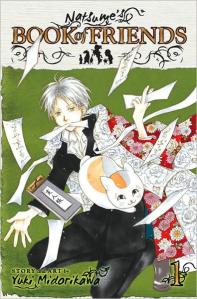Kate (The Manga Critic) Dacey is running a Half-Time Poll: The Best New Manga of 2010, and it’s illustrative of how much good manga has launched this year, in spite of the various woes the industry has faced. Just about every candidate has at least a couple of votes, which is nice to see. I wanted to post a few more thoughts on my five choices and cite a couple of runners-up, since some of my picks were very close shaves indeed.
 All My Darling Daughters, written and illustrated by Fumi Yoshinaga (Viz): This book has garnered a lot of critical acclaim since its release, some of it from me:
All My Darling Daughters, written and illustrated by Fumi Yoshinaga (Viz): This book has garnered a lot of critical acclaim since its release, some of it from me:
“Everything is more complicated than it seems in Yoshinaga’s narrative universe. People are both nicer and meaner than they initially seem, and relationships are more quietly satisfying and functional than an observer might assume. Yoshinaga is deeply interested in the grace notes of interpersonal interaction, even in her slighter works. That’s the source of a lot of the pleasure for me – the apparently minor, digressive moments that get to the heart of her characters.”
I always at least like Yoshinaga’s work, and I usually love it. This book is no exception, and it’s one that I’d recommend to non-manga readers without hesitation, especially if they like slice-of-life stories with complex women characters.
My runner-up for this slot would be Natsume Ono’s Ristorante Paradiso, which I reviewed here. When Ono’s House of Five Leaves is released in print, it will certainly be in my top five if Kate does a similar poll for the second half of 2010.
 Bunny Drop, written and illustrated by Yumi Yunita (Yen Press): I’m so delighted to see that this book is tied for the lead in Kate’s poll, as I hope its critical acclaim results in solid sales. It’s from the often-neglected josei category for adult women, so I’m automatically inclined in its favor, and it’s also really, really good:
Bunny Drop, written and illustrated by Yumi Yunita (Yen Press): I’m so delighted to see that this book is tied for the lead in Kate’s poll, as I hope its critical acclaim results in solid sales. It’s from the often-neglected josei category for adult women, so I’m automatically inclined in its favor, and it’s also really, really good:
“Under another creator, this might be fodder for wacky domestic comedy, with the bachelor dad screwing up in ostensibly hilarious ways. (The back-cover text tries to imply that this is the case. Only one sentence ends with a humble period, with the rest sporting exclamation and question marks.) Unita’s approach is in a much lower key, and I think the results are distinctly satisfying.”
 I’ll Give It My All… Tomorrow, written and illustrated by Shunjo Aono (Viz): I haven’t properly reviewed this series yet, but I’ve written about it fairly often, usually to note that it’s one of my favorite series in Viz’s SigIKKI initiative. This should also lead you to conclude that it’s one of my favorite current manga series, period, as I love a lot of those books:
I’ll Give It My All… Tomorrow, written and illustrated by Shunjo Aono (Viz): I haven’t properly reviewed this series yet, but I’ve written about it fairly often, usually to note that it’s one of my favorite series in Viz’s SigIKKI initiative. This should also lead you to conclude that it’s one of my favorite current manga series, period, as I love a lot of those books:
“It’s always possible that the schlub who stars in Shunju Aono’s I’ll Give It My All… Tomorrow (Viz) will eventually succeed, or at least that he’ll stop quitting halfway through whatever he happens to be trying, but in the meantime, we can revel in the crushing disappointment. I should also note that the series is really funny and that Aono seems to be trying to eschew the “But isn’t this loser secretly really awesome?” undertones that inform similar schlub-centric comics.”
 Natsume’s Book of Friends, written and illustrated by Yuki Midorikawa (Viz): You only have to look at the poll to conclude that a lot of great shôjo launched this year, so picking a single favorite is tough. It’s not impossible, though, especially with this supernatural, episodic charmer from Midorikawa in the running:
Natsume’s Book of Friends, written and illustrated by Yuki Midorikawa (Viz): You only have to look at the poll to conclude that a lot of great shôjo launched this year, so picking a single favorite is tough. It’s not impossible, though, especially with this supernatural, episodic charmer from Midorikawa in the running:
“I like the variety that Midorikawa finds in the premise and the mix of comedy and sentiment in the individual episodes. Her view of the relationship between humans and yôkai is complex, and I particularly love the counterpoint between grandmother and grandson. Reiko turned her isolation and otherness into hostility and control. Takashi turns his into generosity of a sort, or at least into enlightened self-interest. And young Reiko is a sly hoot, even if she is nasty, or maybe because she’s nasty.”
I’m not generally interested in anime, but I have watched a couple of episodes of this book’s adaptation, and they are glorious, just what you’d hope the comic would become if given motion and sound. As for the other exemplary shôjo arrivals so far this year, it saddens me to note that both only got one volume out before their publisher, CMX, got its plug pulled by DC. I’ll talk more about Miku Sakamoto’s Stolen Hearts and Mayu Fujikata’s My Darling! Miss Bancho tomorrow when I beg another publisher to rescue them.
 Twin Spica, written and illustrated by Kou Yaginuma (Vertical): Are you sick of me writing about this book? Too bad. It’s too good to neglect:
Twin Spica, written and illustrated by Kou Yaginuma (Vertical): Are you sick of me writing about this book? Too bad. It’s too good to neglect:
“Yaginuma renders all of Asumi’s difficulties with admirably straightforward delicacy and attention to detail. There’s plausibility to the process Asumi pursues and the examination system itself. There’s also a wonderful earnestness to Asumi’s dreams and her desire to reach out to the people who share them. Factor in the aching sadness that provides underpinnings for Asumi’s quest and you have a moving, unusual finished product.”
Much as I love it, it was locked in a death struggle with runner-up Saturn Apartments (Viz) written and illustrated by Hisae Iwaoka, which offers another gentle and unexpected take on science fiction.
On the subject of excellent manga, take a few moments to go read some great pieces on the best manga you aren’t reading by Brigid Alverson, Robin Brenner and the aforementioned Kate.
